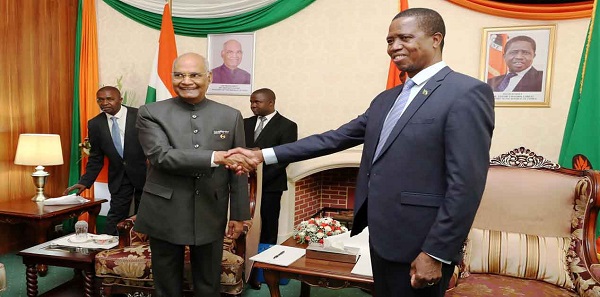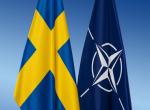India and Africa have nurtured a warm and strong relation through ages. After assuming office in July, 2017, Indian President Shri R N Kovind embarked his third foreign tour to Africa. He visited Equatorial Guinea, Swaziland and Zambia in order to expand India’s engagement and outreach across the African continent. The first country that the President visited was Equatorial Guinea, marking it as the first ever visit of a Head of State from India, followed by Swaziland and Zambia.
Equatorial Guinea
Equatorial Guinea is significant for India since it is the fourth largest oil and gas supplier to India. In the year 2016, ONGC Videsh Limited (OVL) had signed Memorandum of Understanding (MoU) with Equatorial Guinea, to cooperate with Oil and Natural Gas Corporation Ltd (ONGC) Videsh, to explore the potential investment opportunities within the upstream hydrocarbons sector. It has for the first time, been elected as a non-Permanent Member of United Nations Security Council (UNSC) for the term 2018-2019.
During the visit, President Kovind raised issues related to regional and international concern which was followed by delegation level talk with President Obiang of Equatorial Guinea. Both the leaders identified important areas of cooperation, and some of them include: Oil and Gas, Mining and Geology, Health, Agriculture, Fisheries, and Capacity Building. To deepen cooperation further, both the countries also signed agreements on: (i) cooperation in the field of traditional systems of medicine; (ii) cooperation in the field of medicinal plants; and lastly, (iii) cooperation in field of Information and Communication Technology (ICT). They also reaffirmed support to African Union (AU) in finding solution to terrorism, which is a threat to the global peace and security. During the visit of the President, Equatorial Guinea showed its support for endorsement of Comprehensive Convention on International Terrorism (CCIT), proposed by India at the United Nations (UN). The African nation also acknowledged the establishment of the International Solar Alliance in Founding Conference and Summit held at New Delhi, 2018.
As a sign of strengthening relationship with Equatorial Guinea, President Kovind announced setting up of Entrepreneurship Development and Vocational Training Centre, and, also an English Language Training Laboratory. Furthermore, he stated India’s decision to open a resident Diplomatic mission in Malabo. These steps are underway to accelerate the Indian participation in the development of the country. Also, India’s contribution to capacity building and training for achieving the goals of Horizon 2020 programme, is seen as a positive step to enhance relations between the two countries.
Kingdom of Swaziland
The next leg of President’s journey was to the Kingdom of Swaziland on an invitation of His Majesty King Mswati-III. To set India-Swaziland relation on a new track, a MoU on Cooperation in Health Sector and an agreement for exemption of visas for holders of diplomatic/service passports was signed between the two leaders. In order to develop the country by 2022, President Kovind announced construction of new Parliament building of Swaziland by providing technical and financial assistance. He also inaugurated the Information Technology Centre located in the Royal Science and Technology Park (RSTP), built through a concessional credit-line of $20million from the Government of India to the Government of Swaziland. The center hosts the national data center of Swaziland and delivers training in Information Technology (IT). With the success of the RSTP, Kovind also mentioned that India would provide Swaziland a new credit line of $10.4million to help establish a ‘Disaster Recovery Site’ for the National Data Center within the RSTP. Moreover, he announced the opening up of resident Indian diplomatic mission in Swaziland. To this, His Majesty the King, reciprocated the gesture by announcing opening of a diplomatic mission in New Delhi in the near future.
The donation provided by India for medicines and medical equipment worth $3 million was appreciated, making India as the vital source to have affordable medicines and drugs. Farming was another area where the two leaders showed cooperation and collaboration. For improving the productivity of maize in Swaziland, concessional loan of $37.9 million was handed over by the Indian government. Moreover, the Indian President announced India’s assistance in establishing a ‘Centre for Agricultural Excellence’, and also providing assistance of US$ 400,000 for construction of irrigation infrastructure in the Hhohho region of Swaziland. The Government of India has decided to set up 20 solar charging stations in various low electricity access areas of Swaziland. Donation of $1million for the National Disaster Management Agency (NDMA), and an additional in-kind donation of 700 tons of rice and 300 tons of beans for the NDMA, to be used as food-aid for the Swazi population affected by drought and other natural disasters was also announced by the Government. Swaziland has supported India’s candidature for a permanent seat in an expanded UNSC, thus, India agreed to work closely with Swaziland in the UN and other multilateral fora.
Zambia
The last leg of President Kovind’s visit was to Zambia. The inflow of private investment to Zambia is over US$ 5 billion primarily in sectors of mining, infrastructure, manufacturing and pharmaceuticals. There has been a constant increase in trade, from US$1.2 billion in April 2017 to January 2018.
The President of the Republic of Zambia acknowledged India’s contribution towards capacity building in Zambian defense forces. He showed his concern to strengthen the forces in order to provide assistance for training of defense personnel. On the other hand, President Kovind announced Indian government would assist Zambia in health and education sectors worth $3 million. In addition to that around $100,000 is provided to renovate the Mahatma Gandhi Primary School and very soon the Indian government would be constructing the "Mahatma Gandhi Convention Centre” in Lusaka.
Zambia has also signed the International Solar Alliance Framework Agreement which aims to expedite the use of solar energy projects, along with showing cooperation with India in areas of power generation. And, in this regard, India showed its willingness to help Zambia in areas of biomass gasifier source of energy. Furthermore, four agreement were signed between the two leaders: (i) Agreement on the Avoidance of Double Taxation; (ii) MoU on the establishment of the Entrepreneurship Cooperative Development Centre in Zambia; (iii) an agreement on the Exemption of Visa Requirement for Holders of Diplomatic Passports; and lastly, (iv) MoU on Judicial Cooperation.
Overall, the visit of the Indian President to Africa has marked the era of enhancing cooperation which is a step to boost bilateral relations among the countries. The visit of the President is testimonial to the importance of African nations in the foreign policy of India.
Endnotes:
(Views expressed are of the author and do not necessarily reflect the views of the VIF)
Image Source: https://www.lusakatimes.com/2018/04/11/president-lungu-holds-bilateral-talks-with-indian-president-ram-nath-kovind/











Post new comment